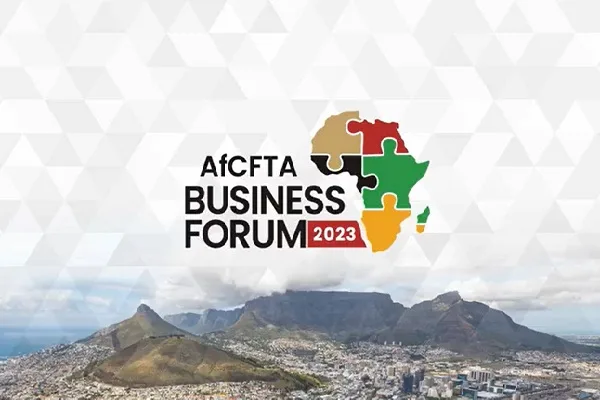AfCFTA Business Forum Portends Africa on Cusp of Economic Transformation
From 16 to 18 April 2023, the #AfCFTA Business Forum is taking place in Cape Town, South Africa. The theme of this year’s Forum is “Accelerating the Implementation of the AfCFTA.”
As at 1Q23, 47 out of 55 member states of the AU have already ratified the AfCFTA Agreement. Eight countries have been selected across the various parts of Africa regrouped under REC to take part in a pilot called the Guided Trade Initiative (#GTI).
In February 2023, during its General Assembly, the AU adopted 2023 as the “Year of the AfCFTA: Acceleration of the African Continental Free Trade Area Implementation.” The AfCFTA is a flagship program under the AU #Agenda2063 to “Build the Africa We Want.”
Individually, even the largest economies in Africa, such as South Africa, Nigeria or Egypt, are outsized when competing on the global stage. But when combined, the overall #GDP of Africa reaches USD 3.5 trillion, compared to USD 23 trillion for USA and USD 18 trillion for China.
There is a firm conviction that the development of the continent can only be truly achieved by transforming the comparative advantage that is the youth bulge into a demographic dividend. This requires harnessing the potential of Africa’s young people for their benefit, that of their families, their countries and ultimately of the entire continent.
AfCFTA SG Wamkele Mene
Similarly, when added together, the total GDP of the EU amounts to USD 17 trillion. For comparison purposes, it is also worth noting that the total GDP of the African Single Market is even slightly higher than of India at USD 3.2 trillion.
Africa has a population of 1.3 billion which is both young and growing comparatively fast. In fact, by 2050 one in four persons in world will be African. Nearly 60% of its population is in the 18-49 year age group.
It is a widely held view that Africa is on the cusp of economic transformation as it moves from an exporter of raw materials to building an industrial base to create more jobs and value locally. In fact, some analysts believe that thanks to the availability of a large pool of labor and raw materials at low cost coupled with a sizeable market, Africa possesses many of the attributes to become the next ‘Factory of the World.’
The number of countries vying for Africa is also an indication that Africa is set for a bright future. Africa must select a few value chains where it can become a global leader. African countries must work together, pool their resources and harmonize their policies towards a common goal.
In recent months, there has been incessant requests for business partnerships from the USA, EU, India, China, and South America. I encourage you in the Private Sector to grab those opportunities for business alliances. It is from those alliances that we incubate ideas for Continent-to-Continent Free Trade.
AUC Deputy Chair Dr Monique Nsanzabaganwa
One of the future industries where Africa can play a leading role is in the production of Electric Vehicles (EV). For instance, all the #CriticalMinerals that go into the manufacturing of the batteries can be found in #SADC and a Regional Value Chain (#RVC) can be set up to find synergies. With the correct policies encouraging Local Value Addition (#LVA), Africa stands to reap great benefits from the #EnergyTransition.
Extending this concept further, Africa can become a global hub for car assembly. Several countries already have vehicle assembly plants of famous brands. In particular, the Gauteng Auto City already houses BMW, Ford, Toyota and other famous auto brands and ambitions to develop into a world-class auto park.
Another issue which displayed its urgency and relevance due to the Ukraine-Russia conflict is #FoodSecurity. As Ukraine is a major world supplier of wheat and fertilizers, many parts of the world experienced hyperinflation for food prices, if not outright shortage.
Taking chocolate as a case in point, the African growers of cacao only reap a measly 6% share of the total value of final product. Therefore, Africa must promote local agro-processing to not only localize benefits but to also ensure its food security in the event of another disruption of global supply chain.
We have Burkina Faso, which is growing cotton and then producing finished textile. Moreover, chocolate-making has become a reality in Ghana. We are seeing more and more African value-add.
Naledi Pandor, Minister of International Relations and Cooperation of South Africa
During the #COVID pandemic, #HealthSecurity became an acute issue as countries fought and hoarded medical supplies. Africa cannot keep relying on foreign imports for masks, vaccines and drugs. The COVID pandemic has shown the necessity and urgency for Africa to develop its own pharmaceutical manufacturing capabilities in order to be better prepared for the next pandemic.
The AfCFTA allows Africa to leverage the attractiveness of a single large market and its population dividend to achieve economies of scale, thus making Africa a compelling destination for #FDI. African states must coordinate their policies to attract investments that support Africa to move up the global value chain (#GVC).

